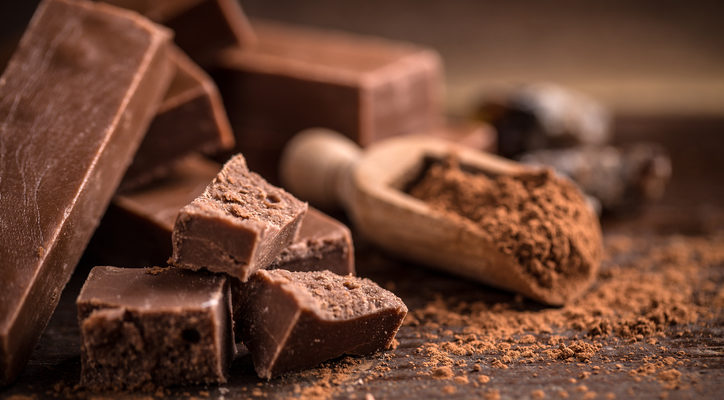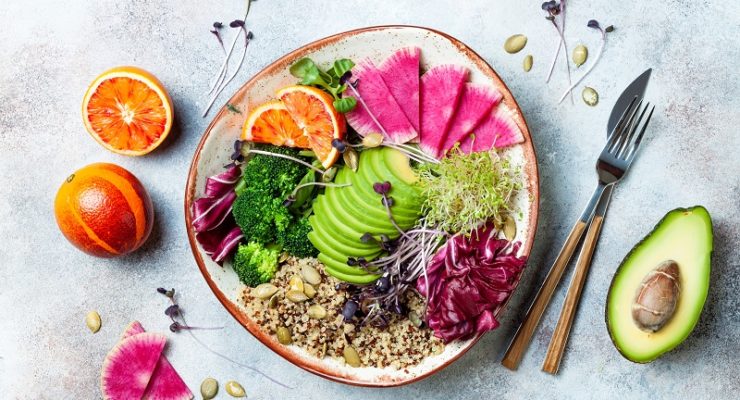There are lots of reasons to love chocolate. If you’re like most “chocoholics,” you probably don’t need any more justification to indulge. But in case you were wondering if there’s anything sweet about chocolate besides its taste, the answer is yes. Chocolate is a plant food (yay!) made from the bean of the cacao plant. It’s full of health-protecting antioxidants. Research suggests that chocolate―the dark kind, in particular―may be chockfull of all kinds of physical, mental and emotional health benefits. We’ve included 14 of those fabulous benefits below.
But before you go chowing down on the nearest chocolate bar, keep this in mind: Not all chocolates are created equal. While the chocolate you know and love is also full of fat and sugar, choosing the healthiest version—dark chocolate with a minimum of 65 percent cacao—can be a smart snack choice. Dark chocolates have a higher concentration of body-boosting antioxidants than milk chocolate. They also typically contain fewer added sugars and unhealthy fats. So a good rule of thumb is: the darker, the better. Opt for less-processed options containing a minimum of 65 percent cacao, and don’t overindulge. The jury is still out on the exact amount of dark chocolate needed to reap the benefits, but we all know what too much indulging can lead to. Shoot for a maximum of one to two ounces a day.
On the Nutrisystem program? You can still have your chocolate and eat it, too! Just limit yourself to a maximum of 2 dark chocolate minis (or about ½ ounce) a day, and be sure to count these as three Extras.
1. It may lower cholesterol.
Cocoa powder is rich in polyphenols, a large class of chemical compounds also found in fruits, veggies, tea and plants. A study in the Journal of Nutrition suggests that the polyphenolic substances in cocoa powder may help reduce LDL, otherwise known as the “bad cholesterol.” These substances may also suppress oxidized LDL―particularly good news since oxidized LDL can clog blood vessels and cause all kinds of health complications. Just as sweet? The study also suggests that these compounds can cause an increase in the “good cholesterol,” HDL, which may be protective against heart disease. Although exciting, many of the studies on chocolate and cholesterol are short-term, so more long-term studies are needed.
2. It could help keep you sharp.
Feeling forgetful? Grab a piece of chocolate! The cocoa in chocolate is packed with flavanols, naturally occurring compounds also found in some fruits, tea and red wine, which have antioxidant properties and may be protective against cognitive decline. Research in the American Heart Association’s Hypertension journal demonstrated that elderly people who drank a lot of powdered cocoa drinks had significantly higher overall cognitive scores than those drinking lower levels.
3. It could keep you heart-healthy.
Perhaps one of the sweetest things about chocolate is its potential role in heart disease prevention. In an analysis of seven studies exploring the relationship between chocolate and cardiovascular health that involved more than 114,000 people from the United States, Germany, Japan, the Netherlands, and Sweden, British researchers discovered that those who ate more chocolate lowered their risk for heart disease significantly. In fact, people who ate the most chocolate weekly had a 37 percent lower risk of any heart disease than those who ate the least amounts of dark chocolate. Researchers contend that the heart-healthy benefits of chocolate may be due to flavonoids, antioxidant compounds that increase the elasticity of veins and arteries.
4. It may protect against stroke.
Although more studies are needed on the optimal quantities and types of chocolate, existing research suggests that eating chocolate might help reduce stroke risk. In a study by Swedish researchers, women who ate about two candy bars per week had a 20 percent lower stroke risk. This study echoes findings from earlier research, which found that people who ate more chocolate were 30 percent less likely to have a stroke.
5. Dark chocolate can calm cravings.
Whether you’re craving something sweet, fatty or savory, we’ve got your solution―dark chocolate! A 2011 study published in the journal Nutrition and Diabetes found that dark chocolate promotes feelings of fullness, reduces a variety of food cravings, and can even lower overall energy intake compared with milk chocolate.
6. It makes you happy.
You already know you’re happy when chocolate’s involved, but now there’s science to back you up! According to a study published in the Journal of Psychopharmacology, those who drank one polyphenol-rich chocolate drink daily (about 1.5 ounces of dark chocolate) reported feeling calmer and more content than those who did not. Researchers contend that the compounds in cocoa can stimulate activity in the brain regions associated with pleasure and reward and boost brain serotonin, a hormone believed to have antidepressant effects.
7. It may lower blood pressure.
We already know that the flavanols found in cocoa have antioxidant properties. As it turns out, these powerful compounds may also help lower blood pressure, improve blood flow to the brain and heart, and make blood platelets less sticky and able to clot. A Harvard study that analyzed 24 chocolate studies involving 1,106 people found that dark chocolate containing at least 50-70 percent cocoa lowered blood pressure in all participants, but most markedly in those with hypertension.
8. It might help you see.
The flavanols in dark chocolate may be to thank for yet another health benefit. Researchers from the University of Reading in England tested the eyesight of 30 healthy adults after they ate white and dark chocolates and found that participants scored better on vision tests after consuming the dark chocolate. Given that dark chocolate has a much higher flavanol content, the researchers concluded that these compounds may be responsible for improving blood flow to the retina.
9. It might help you live longer.
Not only might chocolate add some joy to your life, it might also help extend it! In a Harvard University study, researchers compared men who ate chocolate with those who didn’t, and found that the chocolate-eaters lived one year longer. More research is needed to help determine the exact role chocolate plays in this capacity.
10. It promotes youthful arteries.
A 2016 study of 508 people participating in the Maine-Syracuse Longitudinal Study at the University of Maine found that those who ate chocolate regularly—at least weekly—had less arterial stiffness than those who ate it infrequently or not at all. Arterial elasticity can benefit both your heart and your head. The stiffer your arteries, the harder your heart has to work to pump your blood, which can lead to high blood pressure. And if those arteries are clogged as well as stiff, you run a higher risk of heart attack or stroke. That can be caused when a piece of plaque—the hardened “barnacle” of fat and other debris that clogs your arteries—breaks off and your arteries can’t expand to allow blood flow around it. That kind of log jam can stop the flow of oxygenated blood to your heart and brain, leading to heart attack and stroke. Supple flexible arteries may also help you maintain your youthful brain power. In another study from the same group of researchers, chocoholics also had better cognitive function, as measured by several tests measuring memory and other cognitive abilities.
11. It may help prevent cancer.
At least in a test tube, a number of studies have found that natural cocoa powder, insanely rich in antioxidants called procyanadins and flavanols, can stop the growth of cancers including those occurring in the breast and ovaries. In some cases, a solution of the cocoa powder turned off the genes involved in promoting cell growth. In other cases, including a 2016 study published in the journal Biomedical Pharmacotherapy, the procyanadins in cocoa powder caused ovarian cancer cells to die before they had a chance to multiply and spread.
12. It builds athletic endurance.
Dark chocolate can help you go that extra mile, a new study from London’s Kingston University says. A substance in chocolate, epicatechin, a type of flavanol, helps up the levels of nitric oxide in your body. That helps dilate your blood vessels and reduces the amount of oxygen your body needs to use to keep going. The result: You can go longer. When the researchers switched out one of the daily snacks of a small group of amateur cyclists with about 1.4 ounces of chocolate, they used less oxygen as they pedaled than a similar group that didn’t eat chocolate.
13. It protects unborn babies.
Eating chocolate may help you nourish your baby in the womb. That was the finding from a study by researchers at the Universitie Lavale Quebec City in Canada presented last winter at a meeting of the Society for Maternal-Fetal Medicine in Atlanta. The women who ate about an ounce of chocolate every day for 12 weeks had increase blood flow in the uterus, placenta and in their fetuses, which can help both babies and the placenta that nourishes them to thrive.
14. Um, hello…It’s delicious!
You don’t need any scientific evidence to confirm this: melt it, freeze it, sprinkle it, blend it…. chocolate is tasty every way you try it! Just make sure to enjoy it in moderation, and always opt for dark over milk chocolate to reap the sweetest benefits!
The post 14 Reasons to Have (A Little!) Chocolate Today appeared first on The Leaf.
from The Leaf https://leaf.nutrisystem.com/unexpected-ways-chocolate-improves-your-health/








Post a Comment